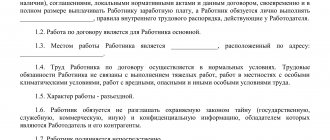Concept
An employment agreement is a type of labor relationship that goes beyond the framework established by the Labor Code of the Russian Federation . They do not have regulated norms and legal force equal to an employment agreement or contract.
They are formed on the basis of the provisions of the Civil Code of the Russian Federation, which distinguishes them from the contractual form of relations that arise between the employer and employees.
They are more mobile, allow you to solve short-term situational problems , but cannot rely on the provisions of the Labor Code of the Russian Federation.
The agreement is concluded when it is necessary to carry out work, without registering the employee under the contract and, moreover, without making an entry in the book.
But in order to determine the guarantees of mutual settlements and fulfillment of the requirements for the work performed, it will be necessary to confirm that the parties have established mutual responsibility in relation to each other.
If the work is one-time in nature, there is no point in introducing a staff unit, but it is advisable to resort to an agreement.
The parties have to resort to a form of recording the fact of activity and calculation, which is determined by civil legal relations.
They reflect contract options:
- contract and subcontract;
- provision of services;
- hiring a servant;
- construction, design work, etc.
The list of features of their application is diverse.
These include agreements with the apartment’s maintenance staff ; similar relationships can be drawn up with a plumber, electrician, etc. Legal relationships with a tutor and medical personnel are acceptable.
Dismissal
As noted earlier, the parties are not bound by an employment relationship. Therefore, termination of the agreement can be made in the following cases:
- At the mutual desire of the parties. If the customer and the contractor agree that further execution of the contract will not lead to the desired result, then it would be most advisable to terminate the relationship by signing an additional agreement to the contract;
- Violation of one of the parties' obligations.
The contract defines the deadlines for completing the work (service) and establishes quality requirements. If there is a violation of this condition, the contractor fails to cope with the assigned responsibilities, then the customer has the right to terminate the agreement.
The executor may also act if the other party does not fulfill its obligations. For example, the customer did not transfer the advance payment or did not provide customer-supplied raw materials, although he should have.
- Upon execution of the contract, when the work is completed and paid for, the agreement will terminate. The citizen will be considered dismissed, since he is no longer bound by any obligations with the organization.
An employment agreement is used in individual cases when an organization needs to solve a one-time problem that it has not encountered before and will not encounter in the future.
A citizen should not agree to work under such a contract if his work function will be permanent. This will only lead to a reduction in his social guarantees.
This is interesting: Passport for written control sample
Advantages and disadvantages
The employer can see the positive aspects of using this type of interaction when hiring a team, which will not require him to constantly monitor the activities of builders (other specialists).
Payment will be made upon high-quality completion of the work, after which mutual settlements will be carried out. This form of relationship does not provide for vacation pay and sick leave , which makes it possible to save some money.
If certain duties are not fulfilled or performed poorly, the employer has the right not to pay wages , including through the court or on the basis of the law on consumer rights. These categories of persons are dismissed without any special legal consequences for the employer.
The vagueness of the legal basis leads to the fact that the relationship becomes blurred, making it difficult to manage the work.
Often this type of relationship attracts unreliable or unscrupulous partners, since penalties for this type of hiring are more than difficult to regulate and impose.
By entrusting urgent and important work to such a partner, you may find yourself in a difficult situation if it involves obligations to third parties.
ATTENTION! If an employer formalizes in an employment agreement types of work that are subject to registration under the Labor Code of the Russian Federation, he is charged with liability on the basis of Part 3 of Article 5.27 of the Code of Administrative Offenses, with the imposition of penalties.
The positive aspects for hired workers (specialists) are that the procedure requires a minimum of provided documentation, characteristics and confirmation of qualifications .
Getting a job, as well as dismissal upon completion, is done quickly.
This gives you the opportunity to manage your time and adjust to receiving orders at your discretion. Since the work schedule is flexible, it is convenient to manage the schedule.
Negative can be called the meager guarantees received from the hiring person. Dismissal can follow at the slightest violation, when the claim for severance pay will have to be defended in court, without a guarantee of recognition of the claim.
If an illness occurs, you will have to adjust the delivery time of services or disrupt them, which can lead to a breakdown in relationships . It’s even worse if the work depends on the supply of resources from the customer or third parties.
The employee will have to engage in organizational activities that are not his responsibility, or take risks .
Differences from an employment contract
What is the difference between an employment contract and an employment agreement?
In addition to the differences in the legal grounds associated with the basis of the agreement on the Civil Code of the Russian Federation, there are other characteristics.
The main differences between an employment contract and an employment agreement are primarily:
- The difference between an employment agreement and an employment contract lies primarily in the fact that not only a legal entity, but also an individual .
- Both an individual and a legal entity can act as a service representative, contractor, subcontractor or employee.
- The parties to the contract are different and depend on its specifics, for example, the customer - the contractor (performer).
- The subject of the agreement is different. With an agreement, this is a one-time job .
- When hired by agreement, persons are not subject to local regulations of the enterprise and other regulations.
- labor agreement and labor contract The employee himself ensures the organization of work and does not obey general rules and does not comply with hierarchical subordination.
- Not subject to personnel records.
- Payments are made in a special mode established by the agreement .
- Payments of sick leave and vacation pay to those working under an agreement are not provided .
- Can be installed for a short period of time, but not less than 5 days .
- When contracting and providing services, one should focus not on the urgency of the agreement, but on the deadlines for the delivery of the object (other work) or the provision of services. Specifying these deadlines is mandatory.
Regulated by legal provisions:
- for construction contracts – Article 73 of the Civil Code of the Russian Federation;
- for other contracts for the provision of services for a fee – Art. 39 Civil Code of the Russian Federation.
REFERENCE: Upon completion of work, an acceptance certificate must be drawn up , on the basis of which mutual settlements are carried out.
How is it regulated?
At the end of the article, we will present you with a sample employment agreement with an individual (form), and now we will analyze how the legal regulation of such a document is carried out. It differs from the classic TD both in the conditions for fulfilling the obligations assumed, and in the nature of the document’s validity, and in the statuses of the contractor/employer.
The Labor Code of the Russian Federation (Article 20) states that any adult capable person can be an employer. That is, it doesn’t matter whether you are an entrepreneur, the head of an LLC, or just an individual who is over 18 years old: you have the right to hire people to perform various types of work. For example, you need to hire a person who will dig up a vegetable garden or carry out landscaping. Or you hire a nanny to look after your child while you go to work: for this you do not need to become an individual entrepreneur or open an LLC, you just need to enter into an agreement. The same situation may exist for an individual entrepreneur or LLC. For example, a team is hired to renovate an office, a specialist is hired to set up a network or maintain a server, but he is not hired.
Next, let's look at Article 48 of the Labor Code, which states that labor relations with an individual are possible only when an agreement is drawn up between two parties. If an individual is not an individual entrepreneur, then when hiring an assistant, he is obliged to enter into an appropriate agreement with him in order to legitimize the process. If this is not done, then both parties will be defenseless in the event of failure to fulfill contractual obligations and will not be able to sue to obtain compensation/seek justice. At the same time, Article 303 of the Labor Code of the Russian Federation regulates this procedure:
- The contract is drawn up in paper form, one party is the employer, the other is the employee.
- TD must be registered with the local government (where you live, not where you are registered).
- When concluding a TD, you assume responsibility for the employee and pay insurance premiums for him.
- If you hire an employee who has not worked anywhere before, then you need to issue a SNILS for him.
After the employee is fired (or finishes work), the employer breaks the contract with him and notifies the self-government authorities (those that he applied to during the registration process). That is, in essence, the legislation equalizes individual entrepreneurs and individuals in terms of responsibilities, but at the same time separates them according to registration rules:
- Individual entrepreneurs do not apply to local governments and do not register contracts. They simply enter documents into their own document flow, register the employee and make entries in the work book.
- An individual who enters into an agreement with a hired employee must contact the local government within three working days and register the agreement. This service does not take much time: it is put on stream.
- If an individual entrepreneur is required to enter data into an employee’s work book, then an individual does not have the right to do this. The hired employee, as proof of work experience, presents only an employment contract (which must be drawn up in paper form).
This is interesting: Form of an official letter sample
Decor
Depending on the scale of the work, the parties choose a design option from among:
- Compiled in simple written form , including at the discretion of provisions, clauses and sub-clauses.
- Draw up and print on a sheet of A-4 format, sealed with the signatures of the parties . For legal entities, a stamp is required.
- Additionally, it is certified at a notary office .
For registration, the text of the agreement is developed, which is prepared in 2 copies and previously discussed by the parties, with the introduction and modification of individual clauses, provisions or the entire text.
IMPORTANT: Make sure that the agreement does not carry the functions of an employment contract and does not include its specific provisions and wording.
Many enterprises develop standard contract forms that are filled out when hiring an employee. In this case, all that remains is to enter the required information and generate the document.
It begins with the name, date of signing and registration number. Next, the parties are identified and the subject of the agreement is established. It becomes the type of work that requires the involvement of specialists or workers.
After its definition, individual provisions determine the rules and nuances of its operation .
ATTENTION! All provisions specified in the agreement, signed by the parties themselves, are subject to mandatory execution.
You must carefully review its text to avoid risks.
The provisions contain unified requirements, which include:
- rights and obligations of the parties;
- responsibility for the work;
- rules and conditions of mutual settlement;
- work acceptance rules;
- quality of services provided, quality criteria;
- provision of equipment and materials;
- responsibility for necessary expenses;
- financial liability for damage to equipment;
- terms of termination of the agreement;
- actions of the parties in force majeure situations;
- conditions for unilateral termination and termination by agreement of the parties.
At the discretion of the parties, depending on the functions and purposes of the document, it provides for the addition of specific clauses and selection of suitable ones.










